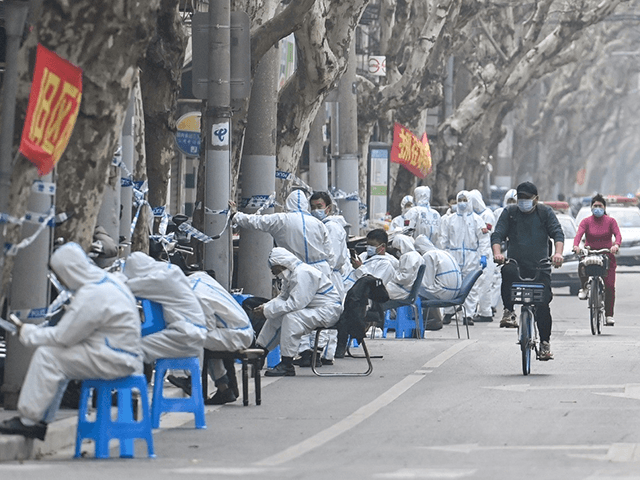Shanghai, one of the wealthiest cities in the world, is currently experiencing food shortages due to stringent lockdown measures designed to contain its ongoing Chinese coronavirus outbreak, the Global Times reported on Thursday.
Chinese Communist Party officials in charge of Shanghai confirmed on April 7 anecdotal reports that many of the city’s 26 million residents were being forced to ration their personal food supplies while confined to their homes. Shanghai’s entire populace has been under stay-at-home orders since April 5, though the city’s authorities first began sealing off residential communities on March 28.
Shanghai Vice Mayor Chen Tong on Thursday admitted to food shortages in the city, acknowledging that the failure to provide residents with basic supplies was due, in part, to Communist Party negligence when organizing the citywide lockdown.
Chen said the following at a press briefing on April 7, as paraphrased by the Communist Party-run Global Times:
Shanghai has sufficient reserves of supplies such as rice and meat, and additional food supplies could be transported from other regions when there’s a need.
Supermarkets and vegetable farms can’t operate normally and there has been reduced delivery capacity of e-commerce platforms due to epidemic prevention, leading challenges in distribution and deliveries, Chen said.
Shanghai has established special working groups to ensure daily supplies, with 10 emergency supply warehouses built, and the city has engaged with more than 100 vegetable production bases.
Shanghai’s food shortages are not the first in China caused by the Communist Party’s misguided lockdown orders, though they are especially alarming given the urban center’s economic importance — indicating that in parts of China less-privileged residents may have fared even worse.
Government officials in northeastern China’s Jilin province, for example, were forced to publicly apologize on March 29 after reports that residents were starving inside their homes during a local coronavirus lockdown leaked online.
Forbes in April 2021 declared Shanghai “the most expensive city in the world,” making its current food shortages all the more shocking.
“Such is the amount of private wealth in Shanghai that exclusive purchases there are now more expensive than anywhere else in the world, including Hong Kong, the former world’s most expensive city,” the U.S.-based business magazine revealed.
“These purchases include ‘degustation’ dinners, lawyers and business class flights, according to Julius Baer, which looked at the cost of ‘a basket of goods and services that reflect the HNWI lifestyle,'” Forbes detailed.
“HNWI” is an acronym for “High-Net-Worth Individual.” Shanghai is no stranger to this demographic, as Forbes listed the city as having the fifth-highest number of billionaires in the world as of March 11.
The South China Morning Post revealed on April 8 that even some of Shanghai’s wealthiest residents — including a billionaire venture capitalist named Kathy Xu Xin — were affected by food supply and delivery shortages in the city during its current lockdown.
“On Thursday a screen capture of a message by Kathy Xu Xin, dubbed as ‘China’s venture capital queen’, asking for ways to buy bread and milk for her family went viral on social media app WeChat,” the newspaper reported.
“The 55-year-old entrepreneur, who was ranked 71 in the World’s Best Venture Capital Investors In 2021 by Forbes, lives in a high-end villa compound in the city’s Pudong District,” according to the SCMP.

COMMENTS
Please let us know if you're having issues with commenting.